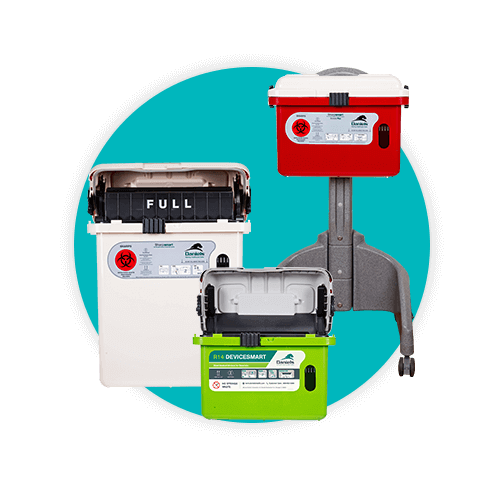Guide to Missouri Medical Waste Regulations

As with any other state throughout the country, Missouri sets forth a number of healthcare waste management regulations. States throughout the country must follow federal regulations, but state legislation often adds to those federal regulations when it comes to medical waste and how to deal with it.
In Missouri, medical waste is designated as “infectious waste” and comes with its own set of rules in addition to those mandated by federal government. The Missouri Department of natural resources defines infectious waste as “waste capable of producing an infectious disease because it contains pathogens of sufficient virulence and quantity so that exposure to the waste by susceptible human host could result in an infectious disease.”
What does infectious waste mean for the Show-Me state?
A number of infectious wastes specified by Missouri medical waste disposal definitions include:
- Blood and blood products
- Pathological waste
- Waste contaminated from surgery and/or autopsy
- Sharps
- Dialysis unit wastes
- Discarded biological materials known or suspected to be infectious
All medical waste generators in the state of Missouri are required to know the law. Taking the cradle-to-grave approach, medical waste generators who produce any volume of medical waste help themselves avoid issues of non-compliance resulting in penalties and fines.
Taking responsibility for generation, storage, transportation, and disposal of medical waste is not only ethical – it’s the law!
This is a lot to absorb. Daniels Health understands that. However, we also stress the importance of knowing not only federal but state guidelines and regulations, as they are often more strict than those of the federal government.
Take, for example, storage requirements. Storage requirements for most types of medical waste must be properly contained and labeled appropriately and prominently. Containers must meet the requirements of Missouri’s waste regulations, found under 29 CFR 1910.1030. Yes, that’s the Code of Federal Regulations, most specifically applicable to pathogens. If a state law specific to a topic isn’t found in the Administrative Code of a state, always refer to federal law.
Missouri infectious waste laws and regulations
As with other states, following federal regulations issued from the Environmental Protection Agency (EPA) help protect- through compliance – medical waste generators from penalties and fines. In addition to federal guidelines, every state’s environmental and/or health departments regulate medical waste.
Missouri has a number of departments dealing with medical waste, such as:
- Missouri Department of Natural Resources (DNR)
- Missouri DNR Hazardous Waste Program
- Missouri DNR Solid Waste Management Program
Found on the Missouri Department of Natural Resources website is information regarding laws and regulations of the department and laws found under Missouri statutes, as well as regulations found under Missouri’s code of state regulations and rules, and the department responsible for developing such rules.
It breaks down even further. Under the hazardous-waste category, a number of laws are applicable, including:
- Federal Comprehensive Environmental Response, Compensation, and Liability Act
- Federal Facility Compliance Act
- Federal Resource Conservation and Recovery Act (RCRA)
- Federal Toxicity Substance Control Act
- Missouri Hazardous Waste Management Law
The regulations found under this act are dealt with by Division 24 (Hazardous Substance Emergency Response Office), and Division 25 (Hazardous Waste Management Commission).
Missouri state law also break down exactly what’s covered under Division 25 by chapter. As an example:
- Chapter 3: Hazardous Waste Management System: General
- Chapter 4: Methods for Identifying Hazardous Waste
- Chapter 5: Rules Applicable to Generators of Hazardous Waste
- Chapter 6: Rules Applicable to Transporters of Hazardous Waste
- Chapter 7: Rules Applicable to Owners/Operators of Hazardous Waste Facilities
- Chapter 16: Universal Waste
If you want to get really detailed, take the time to read these chapters. Methods for identification of hazardous waste found under the rules of the Department of Natural Resources (DNR) Division 25 are clear. Read Chapter 4 – Methods for identifying hazardous waste. The specific law is found under 10 CSR 25-4. 261.
Division 80 is in charge of solid waste management, and like division 25’s categories broken down into chapters, the same is applicable to Division 80. For example:
- Chapter 2: General Provisions
- Chapter 7: Infectious Waste Management
Missouri’s Department of Natural Resources has a publication titled “Management of infectious waste by residential and small quantity generators” that states that Missouri law “charges the Missouri Department of Natural Resources and the Missouri Department of Health and Senior Services with the responsibility for regulation of infectious waste management in the state.”
Know the law – it’s important. For example, did you know that in the state of Missouri, small quantity generators of infectious waste are defined as those who produce roughly 220 pounds or less of infectious waste on a monthly basis? Waste categories included in this definition include:
01 / Sharps – meaning hypodermic needles, scalpel blades, and syringes. It also includes other sharp items, including broken glass that may have come into contact with any infectious material.
02 / Stocks and/or cultures of infectious waste or organisms including culture dishes and devices used in the transfer, inoculation, and mixture of cultures.
03 / Any other waste that has the potential of producing an infectious disease generated by healthcare providers including veterinarians, podiatrists, dentist, and physicians.
Per these regulations, Missouri places the responsibility on small quantity waste generators for determining whether medical waste materials generated by the facility are considered infectious waste.
The state of Missouri has also determined that small quantity generators of infectious waste may treat that waste on-site and that doing so doesn’t require approval or any permits from the Department of Natural Resources. Additional specific information regarding treatment of sharps as well as packaging of infectious waste are found under these guidelines.
Don’t worry; we read the fine print! Title X, Division 25 regulations stipulates that the department (DNR) can at any time request additional information regarding the nature and hazards associated with specific types of waste and information regarding quantities and disposition of hazardous waste in regard to storage, treatment, and disposal. Guidelines for the packaging of infectious waste are very specific and must be followed in regard even to small waste generators.
Prevent costly mistakes
Daniels Health knows that dozens if not hundreds of pages of regulations are applicable to healthcare waste management, hazardous waste disposal, and general medical waste disposal methodologies in every state, including that of Missouri.
For more information on how Daniels Health can help your facility stay on top of ever-changing guidelines and regulations, contact us today. Alternatively find out more about our Missouri operations and service capabilities on our Missouri service page here.
Let's Talk!
Your time is valuable, and we don’t want to play hard to get. You can either phone us directly on the details listed on our contact page, or feel free to fill out this short form and one of our team members will get back to you as quickly as possible.
